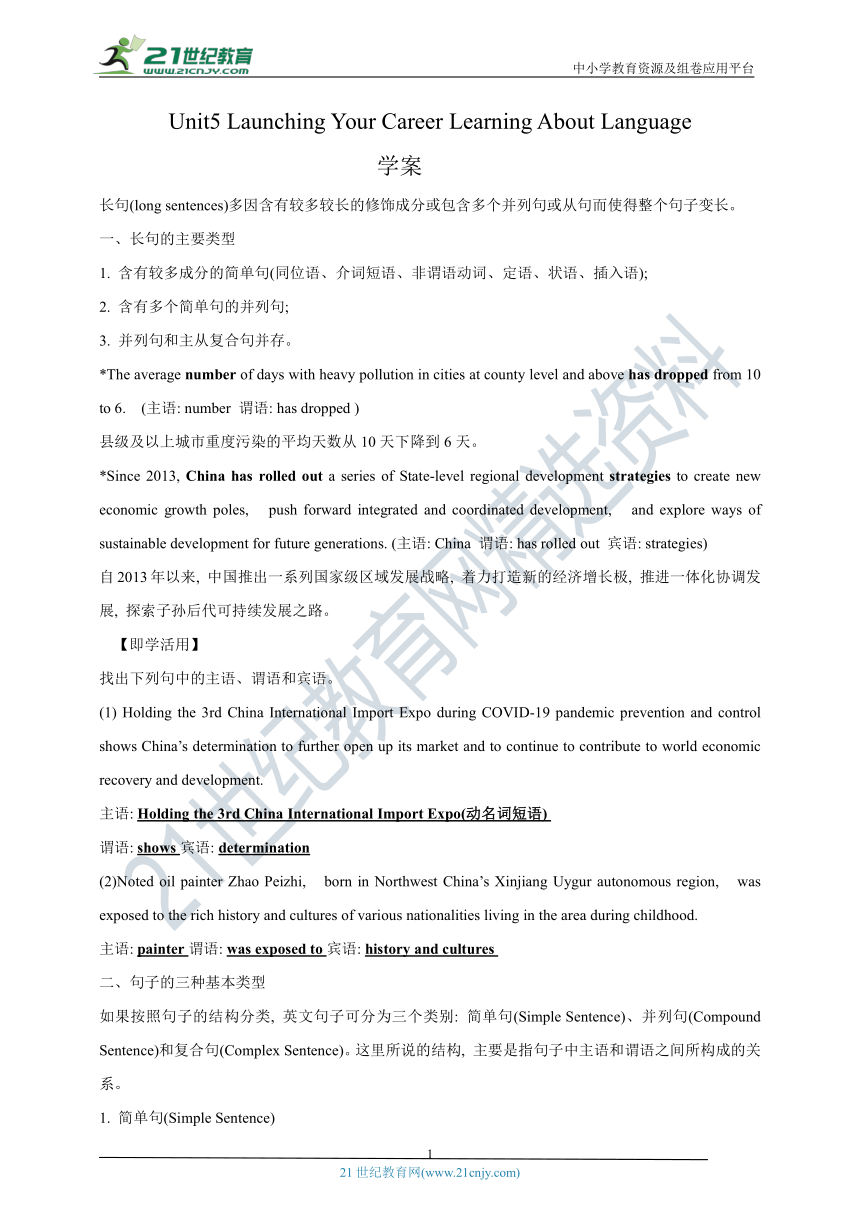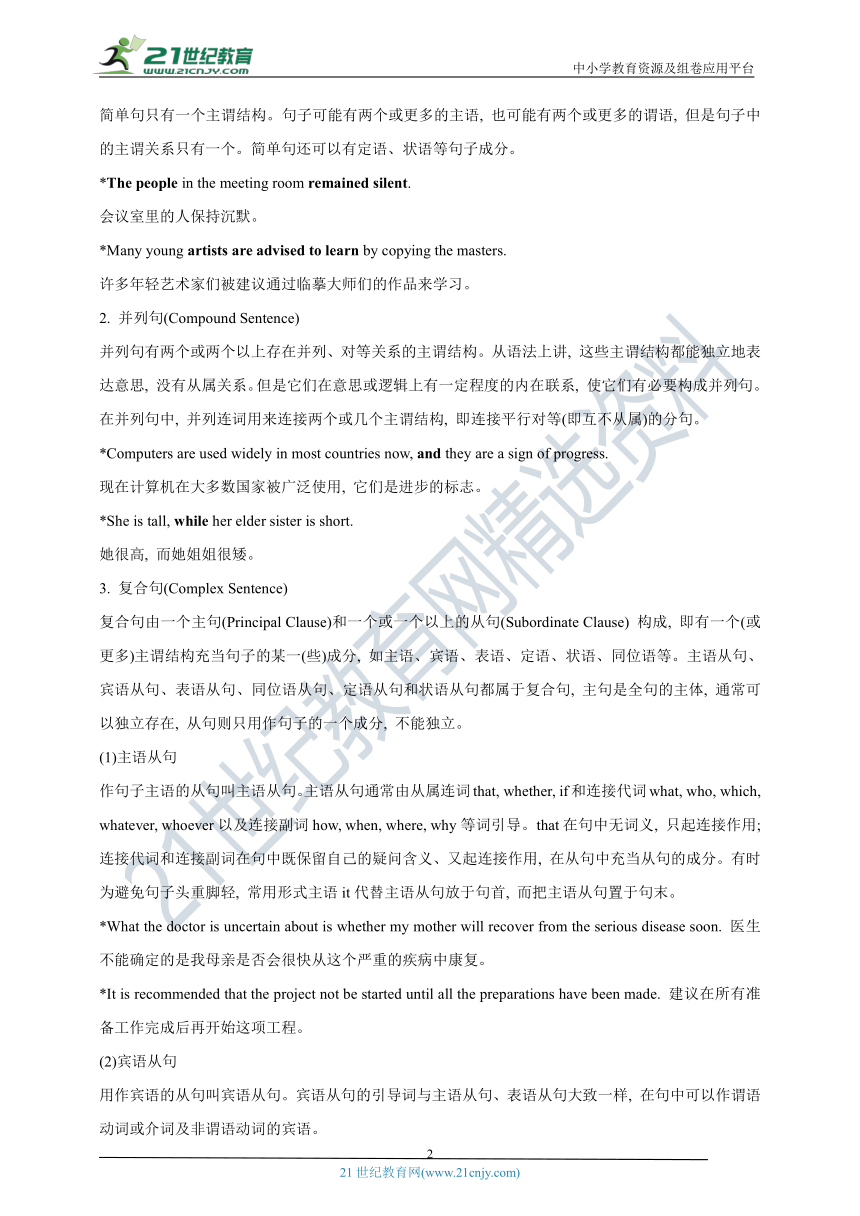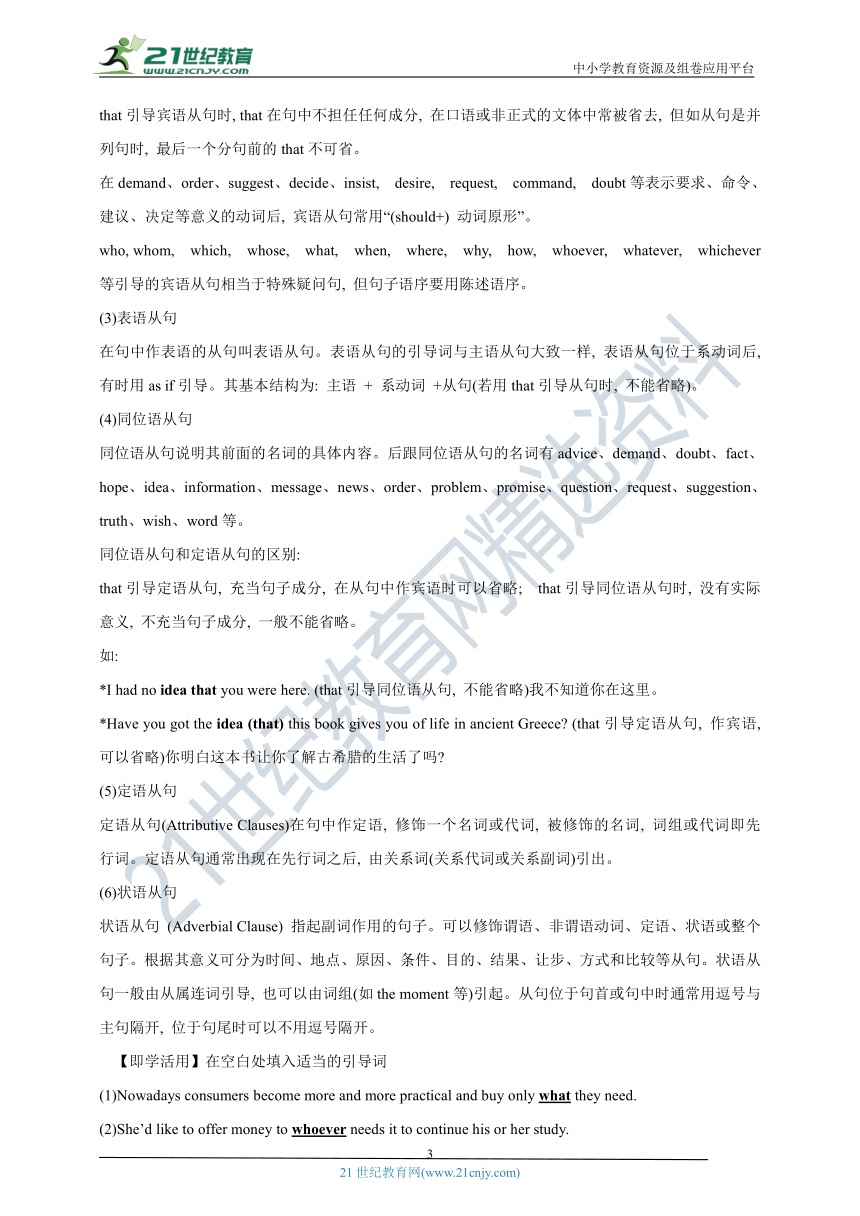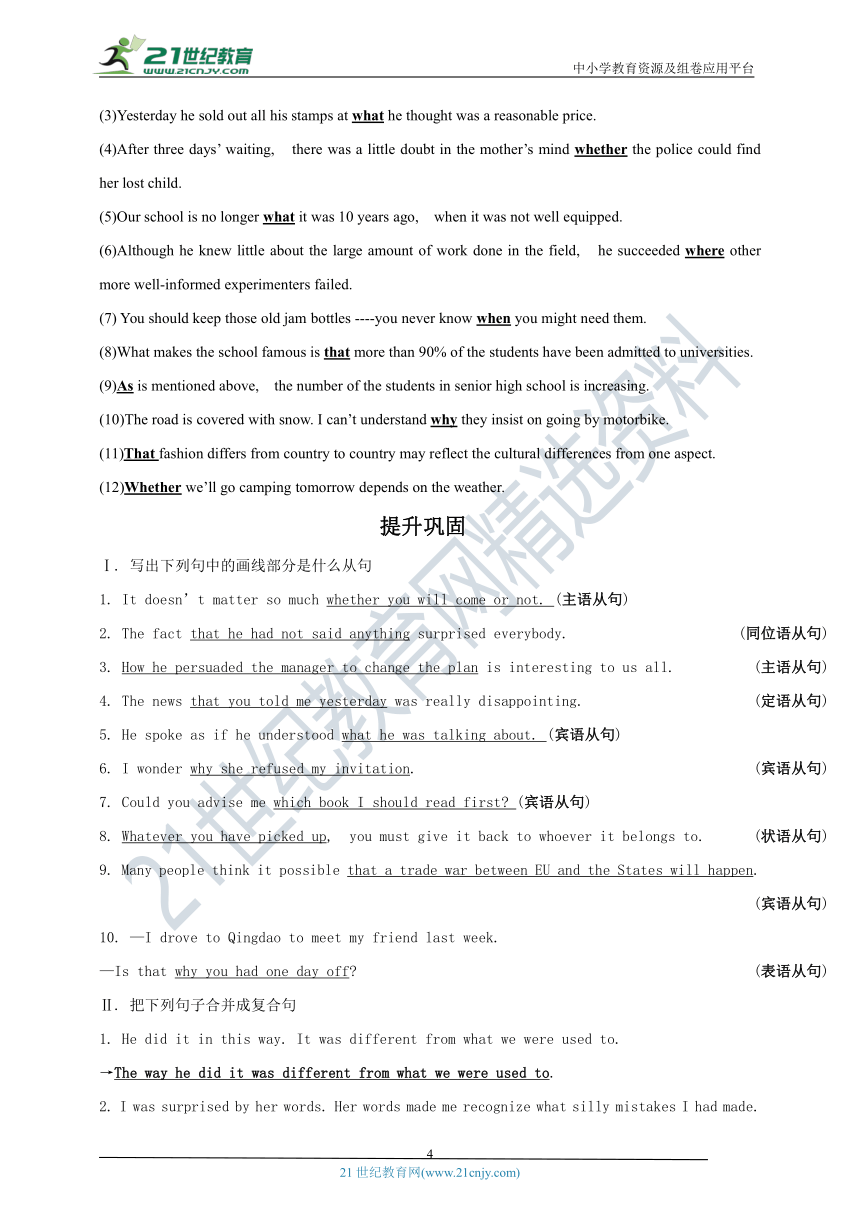人教版(2019)选择性必修第四册 Unit5 Launching Your Career Learning About Language学案
文档属性
| 名称 | 人教版(2019)选择性必修第四册 Unit5 Launching Your Career Learning About Language学案 |

|
|
| 格式 | doc | ||
| 文件大小 | 1.3MB | ||
| 资源类型 | 试卷 | ||
| 版本资源 | 人教版(2019) | ||
| 科目 | 英语 | ||
| 更新时间 | 2021-06-20 10:14:58 | ||
图片预览




文档简介
中小学教育资源及组卷应用平台
Unit5 Launching Your Career Learning About Language
学案
长句(long sentences)多因含有较多较长的修饰成分或包含多个并列句或从句而使得整个句子变长。
一、长句的主要类型
1. 含有较多成分的简单句(同位语、介词短语、非谓语动词、定语、状语、插入语);
2. 含有多个简单句的并列句;
3. 并列句和主从复合句并存。
*The average number of days with heavy pollution in cities at county level and above has dropped from 10 to 6. (主语: number 谓语: has dropped )
县级及以上城市重度污染的平均天数从10天下降到6天。
*Since 2013, China has rolled out a series of State-level regional development strategies to create new economic growth poles, push forward integrated and coordinated development, and explore ways of sustainable development for future generations. (主语: China 谓语: has rolled out 宾语: strategies)
自2013年以来, 中国推出一系列国家级区域发展战略, 着力打造新的经济增长极, 推进一体化协调发展, 探索子孙后代可持续发展之路。
【即学活用】
找出下列句中的主语、谓语和宾语。
(1) Holding the 3rd China International Import Expo during COVID-19 pandemic prevention and control shows China’s determination to further open up its market and to continue to contribute to world economic recovery and development.
主语: Holding the 3rd China International Import Expo(动名词短语)?
谓语: shows宾语: determination
(2)Noted oil painter Zhao Peizhi, born in Northwest China’s Xinjiang Uygur autonomous region, was exposed to the rich history and cultures of various nationalities living in the area during childhood.
主语: painter谓语: was exposed to宾语: history and cultures?
二、句子的三种基本类型
如果按照句子的结构分类, 英文句子可分为三个类别: 简单句(Simple Sentence)、并列句(Compound Sentence)和复合句(Complex Sentence)。这里所说的结构, 主要是指句子中主语和谓语之间所构成的关系。
1. 简单句(Simple Sentence)
简单句只有一个主谓结构。句子可能有两个或更多的主语, 也可能有两个或更多的谓语, 但是句子中的主谓关系只有一个。简单句还可以有定语、状语等句子成分。
*The people in the meeting room remained silent.
会议室里的人保持沉默。
*Many young artists are advised to learn by copying the masters.
许多年轻艺术家们被建议通过临摹大师们的作品来学习。
2. 并列句(Compound Sentence)
并列句有两个或两个以上存在并列、对等关系的主谓结构。从语法上讲, 这些主谓结构都能独立地表达意思, 没有从属关系。但是它们在意思或逻辑上有一定程度的内在联系, 使它们有必要构成并列句。在并列句中, 并列连词用来连接两个或几个主谓结构, 即连接平行对等(即互不从属)的分句。
*Computers are used widely in most countries now, and they are a sign of progress.
现在计算机在大多数国家被广泛使用, 它们是进步的标志。
*She is tall, while her elder sister is short.
她很高, 而她姐姐很矮。
3. 复合句(Complex Sentence)
复合句由一个主句(Principal Clause)和一个或一个以上的从句(Subordinate Clause) 构成, 即有一个(或更多)主谓结构充当句子的某一(些)成分, 如主语、宾语、表语、定语、状语、同位语等。主语从句、宾语从句、表语从句、同位语从句、定语从句和状语从句都属于复合句, 主句是全句的主体, 通常可以独立存在, 从句则只用作句子的一个成分, 不能独立。
(1)主语从句
作句子主语的从句叫主语从句。主语从句通常由从属连词that, whether, if和连接代词what, who, which, whatever, whoever以及连接副词how, when, where, why等词引导。that在句中无词义, 只起连接作用; 连接代词和连接副词在句中既保留自己的疑问含义、又起连接作用, 在从句中充当从句的成分。有时为避免句子头重脚轻, 常用形式主语it代替主语从句放于句首, 而把主语从句置于句末。
*What the doctor is uncertain about is whether my mother will recover from the serious disease soon. 医生不能确定的是我母亲是否会很快从这个严重的疾病中康复。
*It is recommended that the project not be started until all the preparations have been made. 建议在所有准备工作完成后再开始这项工程。
(2)宾语从句
用作宾语的从句叫宾语从句。宾语从句的引导词与主语从句、表语从句大致一样, 在句中可以作谓语动词或介词及非谓语动词的宾语。
that引导宾语从句时, that在句中不担任任何成分, 在口语或非正式的文体中常被省去, 但如从句是并列句时, 最后一个分句前的that不可省。
在demand、order、suggest、decide、insist, desire, request, command, doubt等表示要求、命令、建议、决定等意义的动词后, 宾语从句常用“(should+) 动词原形”。
who, whom, which, whose, what, when, where, why, how, whoever, whatever, whichever等引导的宾语从句相当于特殊疑问句, 但句子语序要用陈述语序。
(3)表语从句
在句中作表语的从句叫表语从句。表语从句的引导词与主语从句大致一样, 表语从句位于系动词后, 有时用as if引导。其基本结构为: 主语 + 系动词 +从句(若用that引导从句时, 不能省略)。
(4)同位语从句
同位语从句说明其前面的名词的具体内容。后跟同位语从句的名词有advice、demand、doubt、fact、hope、idea、information、message、news、order、problem、promise、question、request、suggestion、truth、wish、word等。
同位语从句和定语从句的区别:
that引导定语从句, 充当句子成分, 在从句中作宾语时可以省略; that引导同位语从句时, 没有实际意义, 不充当句子成分, 一般不能省略。
如:
*I had no idea that you were here. (that引导同位语从句, 不能省略)我不知道你在这里。
*Have you got the idea (that) this book gives you of life in ancient Greece? (that引导定语从句, 作宾语, 可以省略)你明白这本书让你了解古希腊的生活了吗?
(5)定语从句
定语从句(Attributive Clauses)在句中作定语, 修饰一个名词或代词, 被修饰的名词, 词组或代词即先行词。定语从句通常出现在先行词之后, 由关系词(关系代词或关系副词)引出。
(6)状语从句
状语从句 (Adverbial Clause) 指起副词作用的句子。可以修饰谓语、非谓语动词、定语、状语或整个句子。根据其意义可分为时间、地点、原因、条件、目的、结果、让步、方式和比较等从句。状语从句一般由从属连词引导, 也可以由词组(如the moment等)引起。从句位于句首或句中时通常用逗号与主句隔开, 位于句尾时可以不用逗号隔开。
【即学活用】在空白处填入适当的引导词
(1)Nowadays consumers become more and more practical and buy only what they need.
(2)She’d like to offer money to whoever needs it to continue his or her study.
(3)Yesterday he sold out all his stamps at what he thought was a reasonable price.
(4)After three days’ waiting, there was a little doubt in the mother’s mind whether the police could find her lost child.
(5)Our school is no longer what it was 10 years ago, when it was not well equipped.
(6)Although he knew little about the large amount of work done in the field, he succeeded where other more well-informed experimenters failed.
(7) You should keep those old jam bottles ----you never know when you might need them.
(8)What makes the school famous is that more than 90% of the students have been admitted to universities.
(9)As is mentioned above, the number of the students in senior high school is increasing.
(10)The road is covered with snow. I can’t understand why they insist on going by motorbike.
(11)That fashion differs from country to country may reflect the cultural differences from one aspect. ?
(12)Whether we’ll go camping tomorrow depends on the weather.
提升巩固
Ⅰ. 写出下列句中的画线部分是什么从句
1. It doesn’t matter so much whether you will come or not. (主语从句)?
2. The fact that he had not said anything surprised everybody. (同位语从句)?
3. How he persuaded the manager to change the plan is interesting to us all. (主语从句)?
4. The news that you told me yesterday was really disappointing. (定语从句)?
5. He spoke as if he understood what he was talking about. (宾语从句)?
6. I wonder why she refused my invitation. (宾语从句)?
7. Could you advise me which book I should read first? (宾语从句)?
8. Whatever you have picked up, you must give it back to whoever it belongs to. (状语从句)?
9. Many people think it possible that a trade war between EU and the States will happen. (宾语从句)?
10. —I drove to Qingdao to meet my friend last week.
—Is that why you had one day off? (表语从句)?
Ⅱ. 把下列句子合并成复合句
1. He did it in this way. It was different from what we were used to.
→The way he did it was different from what we were used to. ?
2. I was surprised by her words. Her words made me recognize what silly mistakes I had made.
→I was surprised by her words, which made me recognize what silly mistakes I had made. ?
3. Dave lost his job and was short of money. What he did was to sell his flat and move out with his brother.
→Dave lost his job and was short of money, so what he did was to sell his flat and move out with his brother. ?
4. Whether man can go back to the old days with time machine? It still remains to be a question.
→It still remains to be a question whether man can go back to the old days with time machine. ?
5. What is she going to be when she grows up? Lily has some idea.
→Lily has some idea what she’s going to be when she grows up. ?
6. He made another wonderful discovery. I think this discovery is of great importance to science.
→He made another wonderful discovery, which I think is of great importance to science. ?
7. You should put the dictionary in a place. You can find it easily there.
→You should put the dictionary where you can find it easily. ?
8. Recently I bought a second-hand computer. Its price was very reasonable.
→Recently I bought a second-hand computer, whose price was very reasonable. ?
III、用复合句翻译下列句子并连句成篇。
1. 我想将来当记者, 但我父母建议我当医生。
2. 他们认为, 比起记者来, 医生的待遇更好。
3. 老师建议我做一个职业能力倾向测验。
4. 不管检测的结果怎样, 我现在都要努力学习。
5. 我现在要做的是学好知识, 为未来做好准备。
I want to be a journalist in the future, but my parents suggest that I should be a doctor. They argue that doctors are better paid than journalists. My teacher suggests that I should take a career aptitude test. No matter what the test results are, I will study hard now. What I need to do now is to learn knowledge well and prepare myself for the future. ?
_21?????????è?????(www.21cnjy.com)_
Unit5 Launching Your Career Learning About Language
学案
长句(long sentences)多因含有较多较长的修饰成分或包含多个并列句或从句而使得整个句子变长。
一、长句的主要类型
1. 含有较多成分的简单句(同位语、介词短语、非谓语动词、定语、状语、插入语);
2. 含有多个简单句的并列句;
3. 并列句和主从复合句并存。
*The average number of days with heavy pollution in cities at county level and above has dropped from 10 to 6. (主语: number 谓语: has dropped )
县级及以上城市重度污染的平均天数从10天下降到6天。
*Since 2013, China has rolled out a series of State-level regional development strategies to create new economic growth poles, push forward integrated and coordinated development, and explore ways of sustainable development for future generations. (主语: China 谓语: has rolled out 宾语: strategies)
自2013年以来, 中国推出一系列国家级区域发展战略, 着力打造新的经济增长极, 推进一体化协调发展, 探索子孙后代可持续发展之路。
【即学活用】
找出下列句中的主语、谓语和宾语。
(1) Holding the 3rd China International Import Expo during COVID-19 pandemic prevention and control shows China’s determination to further open up its market and to continue to contribute to world economic recovery and development.
主语: Holding the 3rd China International Import Expo(动名词短语)?
谓语: shows宾语: determination
(2)Noted oil painter Zhao Peizhi, born in Northwest China’s Xinjiang Uygur autonomous region, was exposed to the rich history and cultures of various nationalities living in the area during childhood.
主语: painter谓语: was exposed to宾语: history and cultures?
二、句子的三种基本类型
如果按照句子的结构分类, 英文句子可分为三个类别: 简单句(Simple Sentence)、并列句(Compound Sentence)和复合句(Complex Sentence)。这里所说的结构, 主要是指句子中主语和谓语之间所构成的关系。
1. 简单句(Simple Sentence)
简单句只有一个主谓结构。句子可能有两个或更多的主语, 也可能有两个或更多的谓语, 但是句子中的主谓关系只有一个。简单句还可以有定语、状语等句子成分。
*The people in the meeting room remained silent.
会议室里的人保持沉默。
*Many young artists are advised to learn by copying the masters.
许多年轻艺术家们被建议通过临摹大师们的作品来学习。
2. 并列句(Compound Sentence)
并列句有两个或两个以上存在并列、对等关系的主谓结构。从语法上讲, 这些主谓结构都能独立地表达意思, 没有从属关系。但是它们在意思或逻辑上有一定程度的内在联系, 使它们有必要构成并列句。在并列句中, 并列连词用来连接两个或几个主谓结构, 即连接平行对等(即互不从属)的分句。
*Computers are used widely in most countries now, and they are a sign of progress.
现在计算机在大多数国家被广泛使用, 它们是进步的标志。
*She is tall, while her elder sister is short.
她很高, 而她姐姐很矮。
3. 复合句(Complex Sentence)
复合句由一个主句(Principal Clause)和一个或一个以上的从句(Subordinate Clause) 构成, 即有一个(或更多)主谓结构充当句子的某一(些)成分, 如主语、宾语、表语、定语、状语、同位语等。主语从句、宾语从句、表语从句、同位语从句、定语从句和状语从句都属于复合句, 主句是全句的主体, 通常可以独立存在, 从句则只用作句子的一个成分, 不能独立。
(1)主语从句
作句子主语的从句叫主语从句。主语从句通常由从属连词that, whether, if和连接代词what, who, which, whatever, whoever以及连接副词how, when, where, why等词引导。that在句中无词义, 只起连接作用; 连接代词和连接副词在句中既保留自己的疑问含义、又起连接作用, 在从句中充当从句的成分。有时为避免句子头重脚轻, 常用形式主语it代替主语从句放于句首, 而把主语从句置于句末。
*What the doctor is uncertain about is whether my mother will recover from the serious disease soon. 医生不能确定的是我母亲是否会很快从这个严重的疾病中康复。
*It is recommended that the project not be started until all the preparations have been made. 建议在所有准备工作完成后再开始这项工程。
(2)宾语从句
用作宾语的从句叫宾语从句。宾语从句的引导词与主语从句、表语从句大致一样, 在句中可以作谓语动词或介词及非谓语动词的宾语。
that引导宾语从句时, that在句中不担任任何成分, 在口语或非正式的文体中常被省去, 但如从句是并列句时, 最后一个分句前的that不可省。
在demand、order、suggest、decide、insist, desire, request, command, doubt等表示要求、命令、建议、决定等意义的动词后, 宾语从句常用“(should+) 动词原形”。
who, whom, which, whose, what, when, where, why, how, whoever, whatever, whichever等引导的宾语从句相当于特殊疑问句, 但句子语序要用陈述语序。
(3)表语从句
在句中作表语的从句叫表语从句。表语从句的引导词与主语从句大致一样, 表语从句位于系动词后, 有时用as if引导。其基本结构为: 主语 + 系动词 +从句(若用that引导从句时, 不能省略)。
(4)同位语从句
同位语从句说明其前面的名词的具体内容。后跟同位语从句的名词有advice、demand、doubt、fact、hope、idea、information、message、news、order、problem、promise、question、request、suggestion、truth、wish、word等。
同位语从句和定语从句的区别:
that引导定语从句, 充当句子成分, 在从句中作宾语时可以省略; that引导同位语从句时, 没有实际意义, 不充当句子成分, 一般不能省略。
如:
*I had no idea that you were here. (that引导同位语从句, 不能省略)我不知道你在这里。
*Have you got the idea (that) this book gives you of life in ancient Greece? (that引导定语从句, 作宾语, 可以省略)你明白这本书让你了解古希腊的生活了吗?
(5)定语从句
定语从句(Attributive Clauses)在句中作定语, 修饰一个名词或代词, 被修饰的名词, 词组或代词即先行词。定语从句通常出现在先行词之后, 由关系词(关系代词或关系副词)引出。
(6)状语从句
状语从句 (Adverbial Clause) 指起副词作用的句子。可以修饰谓语、非谓语动词、定语、状语或整个句子。根据其意义可分为时间、地点、原因、条件、目的、结果、让步、方式和比较等从句。状语从句一般由从属连词引导, 也可以由词组(如the moment等)引起。从句位于句首或句中时通常用逗号与主句隔开, 位于句尾时可以不用逗号隔开。
【即学活用】在空白处填入适当的引导词
(1)Nowadays consumers become more and more practical and buy only what they need.
(2)She’d like to offer money to whoever needs it to continue his or her study.
(3)Yesterday he sold out all his stamps at what he thought was a reasonable price.
(4)After three days’ waiting, there was a little doubt in the mother’s mind whether the police could find her lost child.
(5)Our school is no longer what it was 10 years ago, when it was not well equipped.
(6)Although he knew little about the large amount of work done in the field, he succeeded where other more well-informed experimenters failed.
(7) You should keep those old jam bottles ----you never know when you might need them.
(8)What makes the school famous is that more than 90% of the students have been admitted to universities.
(9)As is mentioned above, the number of the students in senior high school is increasing.
(10)The road is covered with snow. I can’t understand why they insist on going by motorbike.
(11)That fashion differs from country to country may reflect the cultural differences from one aspect. ?
(12)Whether we’ll go camping tomorrow depends on the weather.
提升巩固
Ⅰ. 写出下列句中的画线部分是什么从句
1. It doesn’t matter so much whether you will come or not. (主语从句)?
2. The fact that he had not said anything surprised everybody. (同位语从句)?
3. How he persuaded the manager to change the plan is interesting to us all. (主语从句)?
4. The news that you told me yesterday was really disappointing. (定语从句)?
5. He spoke as if he understood what he was talking about. (宾语从句)?
6. I wonder why she refused my invitation. (宾语从句)?
7. Could you advise me which book I should read first? (宾语从句)?
8. Whatever you have picked up, you must give it back to whoever it belongs to. (状语从句)?
9. Many people think it possible that a trade war between EU and the States will happen. (宾语从句)?
10. —I drove to Qingdao to meet my friend last week.
—Is that why you had one day off? (表语从句)?
Ⅱ. 把下列句子合并成复合句
1. He did it in this way. It was different from what we were used to.
→The way he did it was different from what we were used to. ?
2. I was surprised by her words. Her words made me recognize what silly mistakes I had made.
→I was surprised by her words, which made me recognize what silly mistakes I had made. ?
3. Dave lost his job and was short of money. What he did was to sell his flat and move out with his brother.
→Dave lost his job and was short of money, so what he did was to sell his flat and move out with his brother. ?
4. Whether man can go back to the old days with time machine? It still remains to be a question.
→It still remains to be a question whether man can go back to the old days with time machine. ?
5. What is she going to be when she grows up? Lily has some idea.
→Lily has some idea what she’s going to be when she grows up. ?
6. He made another wonderful discovery. I think this discovery is of great importance to science.
→He made another wonderful discovery, which I think is of great importance to science. ?
7. You should put the dictionary in a place. You can find it easily there.
→You should put the dictionary where you can find it easily. ?
8. Recently I bought a second-hand computer. Its price was very reasonable.
→Recently I bought a second-hand computer, whose price was very reasonable. ?
III、用复合句翻译下列句子并连句成篇。
1. 我想将来当记者, 但我父母建议我当医生。
2. 他们认为, 比起记者来, 医生的待遇更好。
3. 老师建议我做一个职业能力倾向测验。
4. 不管检测的结果怎样, 我现在都要努力学习。
5. 我现在要做的是学好知识, 为未来做好准备。
I want to be a journalist in the future, but my parents suggest that I should be a doctor. They argue that doctors are better paid than journalists. My teacher suggests that I should take a career aptitude test. No matter what the test results are, I will study hard now. What I need to do now is to learn knowledge well and prepare myself for the future. ?
_21?????????è?????(www.21cnjy.com)_
